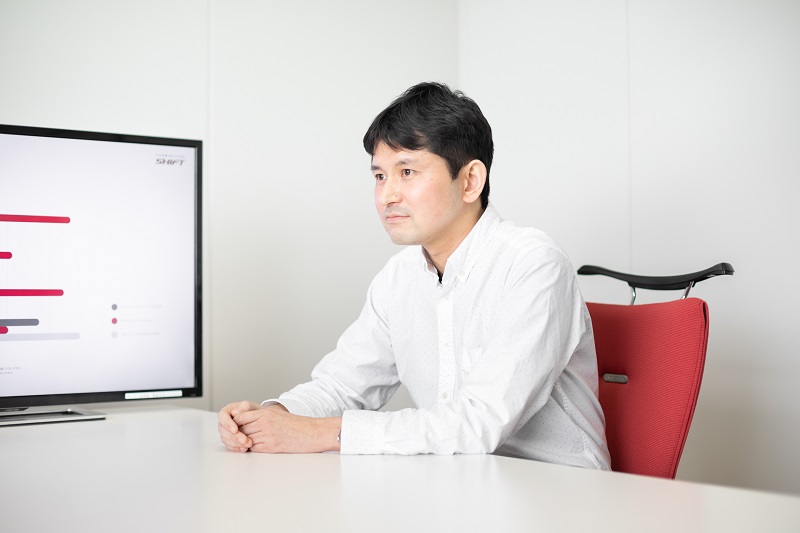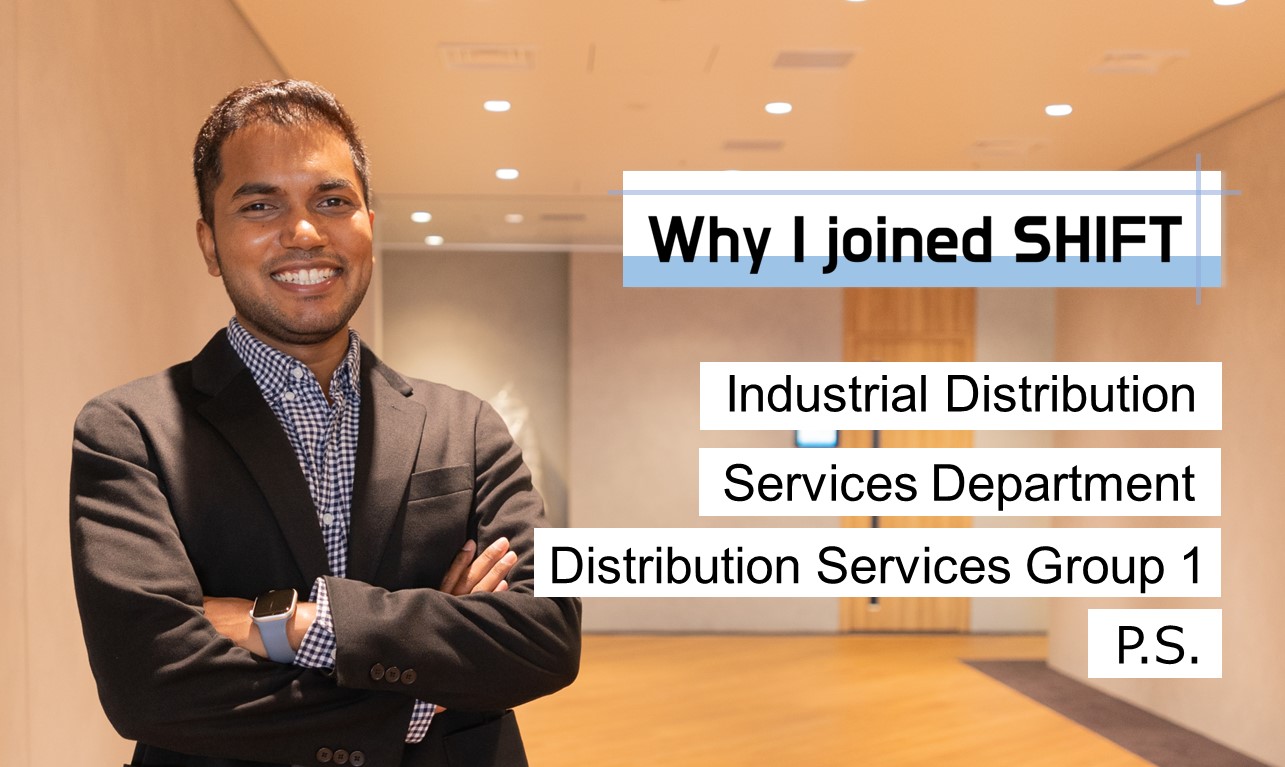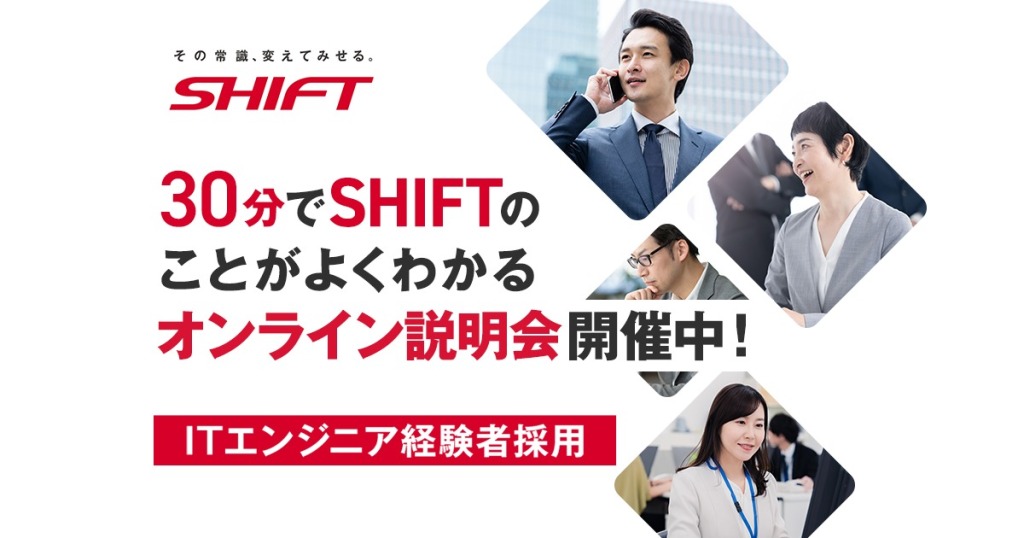
In the ever-changing distribution industry, SHIFT strives to be the only partner you need for strategic DX projects
Already under pressure to incorporate digital transformation (DX) strategies into their businesses, the distribution industry was further affected by the COVID-19 pandemic.
We asked Koichiro Kondo, Assistant Manager, Service&Technology Department, Logistics & Distributions Service Unit at SHIFT, for further insight.
With consumer lifestyles rapidly changing, the distribution industry has placed even greater emphasis on the fundamentals of commerce, such as sales methods and promotional efforts.
“Even so, the essence of selling and delivering goods remains unchanged,” Kondo observed.
In light of the current trends, we would like to explore the value that SHIFT’s Logistics & Distributions Service Unit provides to this dynamic industry sector.
-

Koichiro Kondo, Assistant Manager, Service&Technology Department, Logistics & Distributions Service Unit. Logistics Service Group2 Group Manager
With approximately 15 years of experience in a major SIer, Kondo spent his career leading system integration projects for leading retailers in the distribution industry. He has been responsible for various projects, including routine and enhancement development and large-scale renewals (approximately 1,000 person-months). In collaboration with sales, he led the entire process from order receipt to release and post-release maintenance.
“I want to continue growing with the company while leveraging my experience,” he said upon joining SHIFT in May 2019. At that time, he was in charge of several accounts as a service manager for project promotion support and testing support projects, mainly for distribution companies.
Then, in September of that year, SHIFT reorganized, and he was promoted to Group Leader. The group, originally about 60 members, has grown to around 200 people. From September 2021, he also assumed the role of Assistant Manager, Service&Technology Department, Logistics & Distributions Service Unit continuing to oversee distribution-related matters.
Contents:
From price appeal to value appeal: updates in the desired shopping experience
It has long been said that consumer values have shifted from prioritizing things to experiences. What has not changed is the need for businesses to continue being chosen by consumers.
The COVID-19 pandemic acted as a tailwind, accelerating digital transformation in an industry already implementing various strategies––such as e-commerce, apps, unmanned stores, and self-checkout––to increase productivity in the face of a decreasing workforce.
At the same time, we have entered an era where products can be delivered anytime, anywhere, with a few taps on a smartphone. Customers can even purchase products online at the same prices they see in stores.
While shoppers experience these achievements as the ultimate convenience, they require brick-and-mortar stores to undergo significant changes.
The beauty of in-person stores is that customers can see, touch, and experience products before purchasing.
Responsive customer service, hospitality, and a consultative approach tailored to the shopper can also enhance this experience.
In other words, the value of a physical store lies in the employees. The introduction of store DX, such as self-checkout, is a means to reduce non-core employee tasks and offer even higher levels of service.
The need for a personalized approach extends to advertising as well.
To encourage consumers to visit retail stores, it has become more effective to conduct sales promotions tailored to individual preferences than mass-marketing measures such as TV commercials.
Consequently, trends have shifted towards building data infrastructure, standardizing member information, and updating consumer apps and e-commerce systems.
DX is becoming a pillar of business strategy, but there are no one-size-fits-all solutions.
For example, challenges differ between department stores and convenience stores due to differences in customer demographics, store numbers, and purchase frequencies.
Even within the same business category, the core competencies of each company are different, so what they want to achieve through DX projects is also different.
Companies will need to incorporate digital and technological advancements without deviating from the essence of selling and delivering products.
Business and DX are closely intertwined in the distribution industry, demanding mutual synergy, which is the trend that I address with our clients.

SHIFT’s new value is providing services on both the QA and PMO axes
Many of our clients in the distribution industry are under pressure to change and are looking to leverage data to create new shopping experiences.
One example of SHIFT’s support is a project to build a data infrastructure for a major convenience store chain to share member IDs across their group companies.
The client’s structure consisted of a holding company, a company responsible for system development, and a company responsible for EC front-end revisions, all running in parallel.
The project became complex due to increased data volume and the number of vendors. As a result, SHIFT was engaged to address the growing need for quality assurance.
SHIFT not only handled QA but also provided services as a PMO, coordinating multiple vendors.
We comprehensively reviewed the entire project, including test strategies, plans, and deliverable reviews, visualizing quality, and detecting problems in the upstream process.
By working closely with the QA team, we could proactively address hidden risks and engage the customer in identifying solutions.
It was a large-scale project with tens of millions of member IDs. Although the schedule was revised, there were no delays within the scope of our responsibilities, and we completed the project successfully.
We received compliments from the client, who said, “The testing process was very helpful in detecting a considerable number of failures;” we believe this was a significant factor in gaining their trust.
In the comprehensive testing phase, the holding company did some of the implementation, while other aspects of the implementation were handled by one of the partner companies.
Even under these circumstances, SHIFT was able to maintain quality levels by establishing a TCoE system that standardizes quality assurance work processes, perspectives, and formats.
We began to receive requests like, “If you are handling testing, you must also understand the business system. Can you also help us with project management?” That was really the beginning of our PMO service expansion.
By building trust based on QA projects and participating in project management as a PMO, we can provide unique value as the only partner you need.

As “One-SHIFT” we want to realize a new collaboration model
We want to realize the “One-SHIFT” concept in the truest sense of the word.
Service&Technology Department primarily focuses on QA and PMO services. However, SHIFT offers a range of services that include consulting, Agile development support, automation, security, infrastructure, migration, and CS.
If you account for our group companies, the scope of services expands to include UI, UX, marketing, vulnerability assessment, and more.
I believe that SHIFT is unique in our ability to seamlessly collaborate across departments, from problem clarification and extraction to development support.
As discussed in the example above, customer issues often extend beyond quality assurance.
We often get asked about the problems and issues a project might face, even during the earliest planning phases. This type of support is where our Consulting Department excels.
Then, after release, operations and maintenance begin, and we are engaged to provide assistance.
While Customer Service excels in this area, we are not limited to responding to end-user inquiries but also handle system modifications when issues arise.
In such cases, we collaborate with the Service&Technology Department to take care of the testing accompanying those modifications.
This model of collaboration with the Customer Success Unit is currently a work in progress, but I believe there is still a lot of room to capitalize on the value that SHIFT can offer if we take a holistic view.
It is a potential area for growth. By incorporating group companies into such collaboration models, there will be no customer issue we cannot address.
At the moment, there may be instances where our customers do not approach us for a project due to a more narrow perception of SHIFT as a company; gaps in our brand image amount to missed opportunities.
We must continue to enhance our value as a company so that SHIFT is the first thing that comes to mind––not only for testing but also for DX.
To achieve this, we have to respond to every challenge our customers face. Within the Logistics Service Group, we aim to expand and deepen collaboration models beyond what currently exists.
Now and in the future, SHIFT aims to be the only partner you need.
(Note: The contents of this article and the affiliations of the interviewees are as of the time of the interview.)








